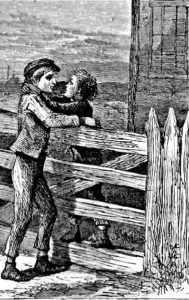There are a multitude of heart wrenching scenes and interactions throughout Oliver Twist that elicit deep sympathy for Oliver from the reader. In fact, after the first several chapters, I stopped being so surprised by the awful circumstances that Oliver continues to find himself in. Time after time, Oliver proves his mental and physical resilience as he is put to work and forced to live on almost no food and barely livable clothing and sleeping accommodations. To me, this seems to have been a device used by Dickens to emphasize Oliver’s good heartedness and strong spirit. By showing Oliver’s very human reactions to the grotesque events that occur in his life, Dickens is also putting an individual face, a face of childhood and innocence, on the concept of poverty in mid 19th century England.
There is one scene in particular that I think best represents the ideas I outlined above: an interaction between Oliver and another child named Dick. It goes as follows:
‘I heard the doctor tell them I was dying,’ replied the child with a faint smile. ‘I am very glad to see you, dear; but don’t stop, don’t stop!’
‘Yes, yes, I will, to say good-b’ye to you,’ replied Oliver. ‘I shall see you again, Dick. I know I shall! You will be well and happy!’
‘I hope so,’ replied the child. ‘After I am dead, but not before. I know the doctor must be right, Oliver, because I dream so much of Heaven, and Angels, and kind faces that I never see when I am awake. Kiss me,’ said the child, climbing up the low gate, and flinging his little arms round Oliver’s neck. ‘Good-b’ye, dear! God bless you!’
The blessing was from a young child’s lips, but it was the first that Oliver had ever heard invoked upon his head; and through the struggles and sufferings, and troubles and changes, of his after life, he never once forgot it. (Dickens 54).
This scene is painful for many reasons. For me, it was a reminder of the serious physical abuse and emotional neglect that the boys must have experienced at the hands of Mrs. Mann, a woman who was obviously only boarding the, to reap the benefits of their stipends, and who was responsible for the deaths, by starvation, of countless children. Despite the kind words and hopefulness of both boys, the way that Dick speaks about heaven and embraces Oliver during the interaction strongly implies that he knows it will be the last time they will see each other in this lifetime.
Most importantly, the detailed way in which this conversation was described, as well as its placement at the end of a chapter, right before Oliver makes his own way to London, forced me to pay attention to this scene. The narrator writes that Dick’s blessing resonated with Oliver so much that “through the struggles and sufferings, and troubles and changes, of his after life, he never once forgot it.” This statement is encouraging for Oliver’s story, if not Dick’s. After reading this passage, I certainly continued to notice the relentless tragedies, small and large, that afflict Oliver throughout the novel. However, with this perspective, I no longer have to wonder what keeps Oliver so strong and motivated to survive through his many conflicts—I just remember this scene and the profound impact it had on little Oliver.

Oliver and Little Dick, Sol Eytinge, Jr. (1867), Image taken from http://www.victorianweb.org/art/illustration/eytinge/180.html
Dickens often uses children to add pathos to his scenes of urban poverty — this is a great example. It often reminds me of the kind of sentimental work Elizabeth Barrett Browning does in her poem “The Cry of the Children”: https://www.poetryfoundation.org/poems/43725/the-cry-of-the-children
It’s no wonder that works by Dickens and Barrett Browning had such an impact on readers in ways that caused people to work to change conditions in workhouses (Dickens) and factories (BB).